(1053 products available)












































































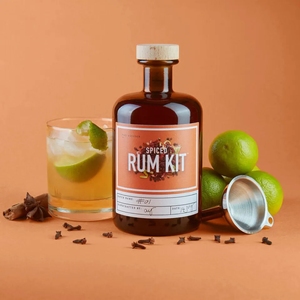
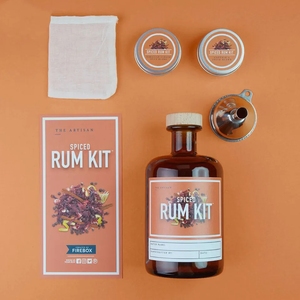
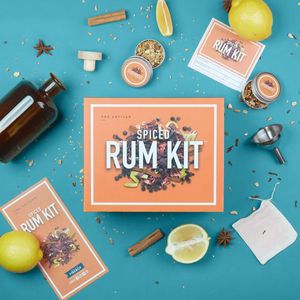
































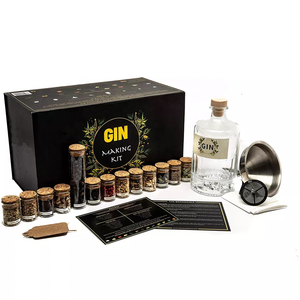
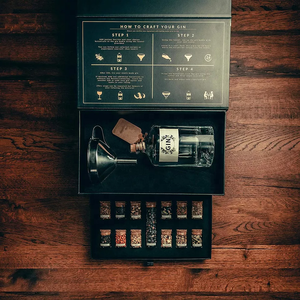

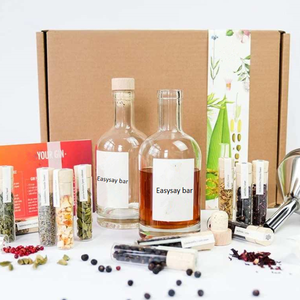
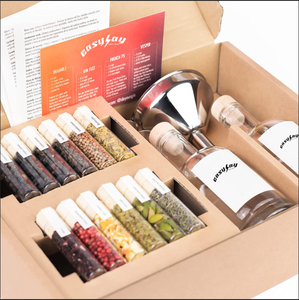





























































































A rum making kit comes with everything one could need to make rum at home. It has the tools, equipment, and ingredients for those interested in distilling their rum. There are different types of rum-making kits, and they include the following:
Beginner rum-making kits
Beginner rum-making kits are designed for people interested in distilling rum but have little experience. The kit is usually user-friendly and has step-by-step instructions on how to use it. A beginner rum-making kit comes with a small still, fermentation vessels, and ingredients like sugar, yeast, and nutrients.
Advanced rum-making kits
Advanced rum-making kits are for experienced distillers who want to make more complex and higher-quality rum. The kit comes with larger stills with advanced features like temperature control, multiple burners, and larger capacities. It also comes with a wider range of ingredients, including molasses and flavored additives.
DIY rum-making kits
DIY rum-making kits are for people who want to build their stills. The kits come with all the materials needed to construct a functioning still, including detailed instructions and diagrams. It includes components like copper tubing, welding rods, and other necessary materials.
Specialized rum-making kits
Specialized rum-making kits are designed for specific types of rum, such as flavored or spiced rum. The kits come with specialized stills and a complete set of ingredients, including spices and flavoring agents. The kit also includes recipes for various flavored rum.
Home distilling rum kits
Home-distilling rum kits are designed for making not only rum but also whiskey, vodka, and gin. The kits come with versatile stills that can be used for different types of distillates. It also includes a variety of recipes and ingredients for different spirits.
Rum brewing kits
Rum brewing kits are different from distilling kits. They are used for making spiced and flavored rum. The kits come with fermentation vessels, yeast, and flavoring agents. It also includes recipes for brewing various types of rum.
Several factors should be considered when selecting a rum distilling kit to ensure it fits one's experience level, budget, and rum preferences.
Begin by assessing the components of a typical rum-making kit. Ensure it contains essential items like fermentation vessels, a still, airlocks, and hydrometers. Also, consider the quality of the equipment included. For example, stainless steel stills are more durable than copper stills. Copper stills can also be more effective for producing high-quality spirits because they have superior thermal conductivity.
Next, check the experience level. Beginners may find all-inclusive kits with detailed instructions and recipes more beneficial. Such kits may also include essential components like fermentation vessels, stills, and airlocks. On the other hand, experienced distillers may prefer customizable kits that allow them to select individual components or upgrade specific parts to suit their needs.
The type of rum one wishes to produce is also important. If one wishes to make light rums, a reflux still may be more appropriate. A pot still may be better if one is after dark rums. Think about the capacity requirements as well. Small stills may be more appropriate for home use or experimental batches. However, larger stills may be necessary for producing larger quantities of rum for personal consumption or small-scale business.
The kit's cost is also an essential factor. It is advisable to balance the quality of the components with the budget. Additionally, consider the manufacturer's reputation and read reviews to gauge the quality of the kit and the level of customer satisfaction. Some manufacturers may also offer warranty or replacement options.
Finally, consider the legal implications of rum distillation in one's area. In many countries, distilling spirits without a license is illegal, even if it's for personal use. Ensure to research and adhere to local laws and regulations before purchasing a rum-making kit.
Rum-making kits offer a convenient way for enthusiasts to explore rum distillation at home. These kits come with all the necessary tools and materials needed to make rum. They usually contain fermentation vessels, distillation apparatus, and ingredients such as sugar or molasses, yeast, and nutrient additives. The primary function of rum-making kits is to facilitate the home production of rum. They also enable individuals to experiment with different recipes and flavors without having to invest in a full-scale distillation setup.
One key feature of rum-making kits is the inclusion of detailed instruction manuals. These guides are vital for novice distillers as they provide step-by-step directions on the fermentation and distillation processes. Often, the kits come with recipe suggestions that allow users to understand how to customize their rum to suit individual tastes. The distillation apparatus included in the kits is also designed for ease of use. Most of the time, they are compact and suitable for home use, requiring only basic knowledge to operate safely.
The design of rum-making kits is centered around accessibility and convenience. They feature all the essential components neatly packed into one kit, eliminating the need for users to source individual items separately. Also, the kits are designed to be user-friendly, with components that are easy to assemble and operate. They also come with quality materials that are long-lasting and easy to clean after use. Additionally, many kits are packaged in a portable manner, making them ideal for storage and transportation.
Before using any kit, it is necessary to consider the safety and quality aspects. Here are some of the safety and quality features one should look for in a rum distillation kit.
Materials
Safety begins with the materials used in a rum-making kit. The components that come into contact with the alcohol must be of high quality and non-toxic. Look for kits with food-grade stainless steel, copper, or glass components. Some materials, like lead, should be avoided at all costs because they can contaminate alcohol and make it unsafe for consumption.
Certification
Seek certified equipment, like a distillation kit. The certification shows the materials used in making the kit comply with safety standards. The kit should have NSF (National Sanitation Foundation) or CE (Conformité Européenne) markings. The markings show that the kit passed testing for health and safety.
Comprehensive Instructions
A rum-making kit with clear and comprehensive instructions is vital for safety. The instructions should detail how to assemble, use, and clean the components. It should also contain information on distillation techniques and safety precautions. Some kits come with instructional videos or online tutorials. They are helpful for beginners.
Safety Features
Choose a distillation kit with safety features like thermometers, pressure gauges, and safety valves. The components help monitor the distillation process and prevent accidents. For example, a thermometer measures the temperature of the mash or prevents overheating and fire hazards. Safety valves relieve pressure build-up in the still and stop explosions.
Quality of Components
Spare components of the rum-making kit are also essential for safety and quality. The kit should include quality fermentation vessels, mash buckets, and fermentation locks. They ensure the fermentation process is done correctly and stops contamination. Also, the kit should come with quality heating elements, burners, or hot plates. They provide safe and even heating for the still.
Cleaning and Maintenance
Proper cleaning and maintenance of the rum-making kit are vital for safety. It distills alcohol free from impurities. The kit should come with detailed cleaning instructions. It should also include all the necessary cleaning tools, like brushes, sponges, and cleaning agents. It is also essential to regularly inspect the components of the kit for signs of wear or damage. Replace any broken parts.
Q. What is included in a rum-making kit?
A. A typical rum-making kit often includes a fermentation vessel, a still, yeast, and sugarcane or molasses, among other essentials.
Q. Is it legal to make rum at home using a rum-making kit?
A. The legality of making rum at home varies by country and state. It is essential to check local laws and regulations before purchasing a rum-making kit.
Q. How long does it take to make rum with a rum-making kit?
A. The duration required to make rum using a kit can vary depending on the fermentation and distillation process. Typically, it can take several weeks to months to produce high-quality rum.
Q. Can flavoring agents be added to the rum-making kit?
A. Yes, flavoring agents like spices, fruits, and wood chips can be added to the rum-making kit to enhance the flavor of the final product.
Q. What safety precautions should be taken when using a rum-making kit?
A. When using a rum-making kit, distillation should be done in a well-ventilated area, and fire hazards should be taken into consideration. Moreover, it is important to follow the instructions carefully to prevent producing unsafe alcohol.